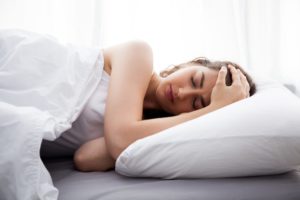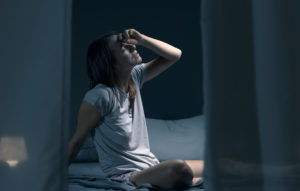Anxiety and Night Sweats
Night sweats are moments of moderate to heavy sweating that happen during sleep. There are a number of conditions associated with night sweats, but identifying the exact cause of this phenomenon can be difficult. One factor that may contribute to night sweats is anxiety, which is known to trigger sweating.
We take a closer look at the possible connection between anxiety and night sweats and offer ways to reduce anxiety for those who experience night sweats.
Can Anxiety Cause Night Sweats?
Anxiety could be a contributor to night sweats. However, there are several complicating factors to consider when exploring the relationship between anxiety and night sweats.
While anxiety is known to cause sweating, the connection between anxiety and night sweats in particular is not well understood . However, there is a clear connection between anxiety, sleep disorders, and sweating, which could suggest a relationship between anxiety and night sweats.
Diagnosing the cause of night sweats for any given person should begin with a thorough medical evaluation . There are reported associations between night sweats and a range of medical conditions. In particular, night sweats may accompany anxiety in a handful of circumstances.
Physical or Emotional Changes
Given the possible relationship between anxiety and night sweats, stressful circumstances that affect a person’s physical or mental health may help explain why that person experiences night sweats. There are many life events and changes that can cause stress, including:
- Starting or losing a job
- Relationship problems
- Loss of a loved one
- Illness
- Having a baby
- Financial issues
Nightmares
Nightmares are vivid, disturbing dreams that cause terror and anxiety in the sleeper. Because stress can be both a cause and an effect of nightmares, people experiencing nightmares may wake up with the physical symptoms associated with anxiety and panic, including sweating.
Post-Traumatic Stress Disorder
Some people who have experienced traumatic life events develop a condition called post-traumatic stress disorder (PTSD). People with PTSD may experience nightmares, sleep disturbances, flashbacks, and other anxiety-inducing symptoms. Such episodes can result in daytime sweating and night sweats.
Menopause
For people nearing or in menopause, night sweats and anxiety are prevalent and often co-occuring conditions . Hot flashes, which happen more frequently at night and are usually accompanied by excessive sweating, are a common symptom of menopause.
Anxiety can accompany hot flashes momentarily, but it also may be a more persistent feature of this life transition. Evidence suggests a relationship between the severity of hot flashes and the severity of anxiety during the years before and after menopause.
Medication Side Effects
Many medications, including opioids and some hormone therapies, can cause sweating and night sweats. Antidepressants, which are sometimes used to treat anxiety, are the medications most likely to cause sweating. People taking antidepressants report both daytime and nighttime sweating which usually begins within the first few weeks of starting treatment.

How to Prevent Anxiety Night Sweats
For people concerned that anxiety may be contributing to their night sweats, there are several strategies that may help address the problem. Some involve reducing underlying anxiety. People can also take steps to create a physical environment that keeps the body cool, reducing the likelihood of sweating during the night.
Mindful Breathing
Mindful breathing is a meditative practice that involves breathing in a controlled manner. Like many mindfulness practices, mindful breathing can help people reduce their stress and anxiety.
Studies on the effects of mindful breathing have been done with menopausal people who experience hot flashes and night sweats. Some studies have found controlled breathing can reduce the number of hot flashes a person experiences. Other studies have found that similar mindfulness practices help people feel less bothered by hot flashes and night sweats.
Other Strategies to Reduce Stress
While many factors that contribute to anxiety are outside of a person’s control, there are ways of reducing stress, including:
- Seeking support from family and friends
- Engaging in daily physical activity
- Avoiding excessive alcohol and caffeine
- Adopting healthy sleep hygiene practices
Strategies for Staying Cool
One of the main ways the body cools itself is through sweating. Finding ways to keep the body cool at night may help reduce night sweats.
- Use a cold compress: A strategically placed cold compress may help keep a person cool. Consider placing the compress on the neck, torso, or in the armpits. Be mindful that skin can be damaged by excessive cold so avoid placing ice directly against it.
- Change your bedding: Use light cotton sheets or other temperature-regulating materials. Avoid polyester sheets or heavy flannel. A range of cooling bedding products are available, including sheets, pillows, and comforters. Sleeping on a mattress that features cooling properties may also help.
- Sleep in a cool environment: On cool nights, consider sleeping with a window open to lower the temperature of your bedroom. Set the thermostat to a lower temperature at night, and use fans to maintain airflow in the bedroom.
When to See Your Doctor About Anxiety and Night Sweats
Night sweats are not unusual, and while they may be unpleasant, they generally are not harmful. However, in some cases, night sweats can be a symptom of a serious medical condition.
“Anxiety and night sweats may have overlapping causes. Both conditions should be brought up with a health care professional sooner rather than later, as effective treatments can be initiated.”
Dr. Abhinav Singh, Sleep Physician
If night sweats are bothering you, keeping you from sleeping, or happening frequently, you should talk to a doctor. Additionally, if any physical changes accompanied the onset of your night sweats, such as unexpected weight gain or loss, fever, or pain, make sure to share this information with your doctor.
Like night sweats, anxiety is a common problem. However, if your anxiety is interfering with your daily life or your anxiety persists despite efforts to manage stress, you should talk to your doctor.

Still have questions? Ask our community!
Join our Sleep Care Community — a trusted hub of sleep health professionals, product specialists, and people just like you. Whether you need expert sleep advice for your insomnia or you’re searching for the perfect mattress, we’ve got you covered. Get personalized guidance from the experts who know sleep best.
References
5 Sources
-
Mold, J. W., Holtzclaw, B. J., & McCarthy, L. (2012). Night sweats: A systematic review of the literature. Journal of the American Board of Family Medicine, 25(6), 878–893.
https://pubmed.ncbi.nlm.nih.gov/23136329/ -
Smetana, G. W. (2023, February 20). Evaluation of the patient with night sweats or generalized hyperhidrosis. In M. D. Aronson (Ed.). UpToDate., Retrieved March 20, 2023, from
https://www.uptodate.com/contents/evaluation-of-the-patient-with-night-sweats-or-generalized-hyperhidrosis -
Zhou, Q., Wang, B., Hua, Q., Jin, Q., Xie, J., Ma, J., & Jin, F. (2021). Investigation of the relationship between hot flashes, sweating and sleep quality in perimenopausal and postmenopausal women: The mediating effect of anxiety and depression. BMC Women’s Health, 21(1), 293., Retrieved March 20, 2023, from
https://pubmed.ncbi.nlm.nih.gov/34372846/ -
Freedman R. R. (2005). Hot flashes: Behavioral treatments, mechanisms, and relation to sleep. The American Journal of Medicine, 118 Suppl 12B, 124–130., Retrieved March 21, 2023, from
https://pubmed.ncbi.nlm.nih.gov/16414337/ -
Carmody, J. F., Crawford, S., Salmoirago-Blotcher, E., Leung, K., Churchill, L., & Olendzki, N. (2011). Mindfulness training for coping with hot flashes: Results of a randomized trial. Menopause, 18(6), 611–620., Retrieved March 21, 2023, from
https://pubmed.ncbi.nlm.nih.gov/21372745/







